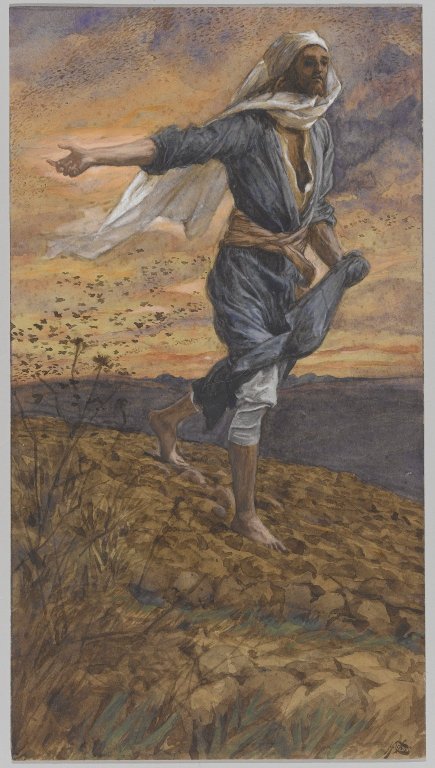15th Sunday of the Year A (10Jul2011)
Is 55. 10-11; Ps 65; Rm 8. 18-23; Mt 13. 1-23
Homily of Fr. Paul Panaretos, S.J.
Decision, Growth, Choice
Today’s gospel is begins a chapter in which Jesus used parables to teach his disciples—and us—about God’s power to transform and to renew people and all creation. It may help us to ponder our transformation better if we consider the question, What is a parable?
A parable is a brief, succinct story, in prose or verse, with a moral or religious lesson. It differs from a fable in which animals, plants, lifeless objects and forces of nature are actors—think of Aesop’s fables—while parables usually feature human actors. The actor in Jesus’ parable today is human, a sower of seed.
A parable is simple in design. With realism and familiarity, it sketches a setting—today, a plot of land; describes an action--someone scattering seed; and shows the results--some seed grew, some did not. A parable often involves a person facing a difficult moral choice. Jesus spoke in parables to direct attention to him and his way of living. Jesus always demands our choice.
 A contemporary theologian repeated an important point when I heard her several years ago: “Parables are stories about ordinary men and women who find in the midst of their everyday lives surprising things happening. [Parables] are not about ‘giants of the faith’ who have religious visions.”1 Indeed! Parables are about people like us, people choosing Jesus repeatedly and entrusting their lives to his gracious power, power we can’t explain.
A contemporary theologian repeated an important point when I heard her several years ago: “Parables are stories about ordinary men and women who find in the midst of their everyday lives surprising things happening. [Parables] are not about ‘giants of the faith’ who have religious visions.”1 Indeed! Parables are about people like us, people choosing Jesus repeatedly and entrusting their lives to his gracious power, power we can’t explain.
Immediately before the verses we heard as our first reading, Isaiah, long before Jesus, had announced again for God that God’s ways are not human’s ways.2 We heard Isaiah offer a clue to the mysterious nature of divine power. Working in patterns unseen and without our scientific understanding, like the pattern of rain-evaporation-condensation-rain, God’s word gives us life and saves us, achieving the end for which I sent it. Life is God’s goal, the pattern of divine working.
When it comes to the way God achieves God’s goal of real life, I feel the helpful proverb, “God writes with crooked lines,” limps. Surely God writes upside down and even backward!
The dying and rising of Jesus, which is the source of real life and offers real life to us at each moment, shocks us when we’re honest. Jesus prepared us by teaching in parables to accept him, our crucified Messiah, as the parable of God and God’s life. Those who have ears, let them hear is not about human acoustics only; Jesus’ words closing his parable invite us to accept Jesus with and by our lives.
This parable of Jesus by which he began teaching his disciples teaches us with its elements of decision, growth and choice.
- Of decision: the sower sowed seed despite the consequences;
- of growth: successful and frustrated; and
- of choice: Those who have ears, let them hear.
Our lives, in the parable’s language, are soil. Alone we may be unable to change it from hard and shallow. Jesus graces us to make our lives deep, rich soil. Keeping hearts and minds focused on Jesus, allows us to make the calculated risks of responding in faith with our fragile lives, which God in Jesus transforms by the power of their Holy Spirit.
To become more aware of God in Jesus transforming you by the power of their Holy Spirit, take 15 minutes daily with Jesus this week.
- First pause to rest in the creative, fruitful and nourishing love of the Trinity.
- Ask the crowds of heaven to present you to Jesus.
- Praise and thank Jesus for the “surprising things” Jesus has done or is doing in and with your life.
- Become of aware of Jesus addressing you, which may register as Jesus inviting you to keep choosing him; Jesus reassuring your faith-response to him; or Jesus allowing something new to emerge on the horizon of your life.
- Close by saying slowly the Lord’s Prayer.
Link to this homily's spiritual exercise
__________________
- Sallie McFague TeSelle, “Parable, Metaphor, and Theology,” Journal of the American Academy of Religion 42.4 (December 1974:630-645). She spoke at a Convocation some years ago at The Divinity School, Yale University, and I noted her remark, which emphasized the ordinariness of the actors above the ordinariness of the circumstances; the latter is mentioned about parables more than the former.
- Isaiah 55.8-9.
__________________________________________________________
Wiki-image of the Sower is in the public domain.
No comments:
Post a Comment